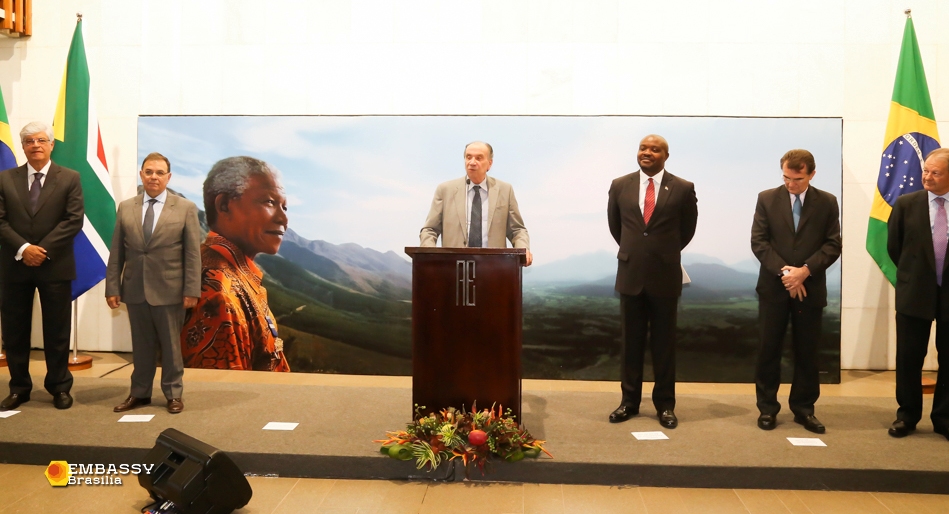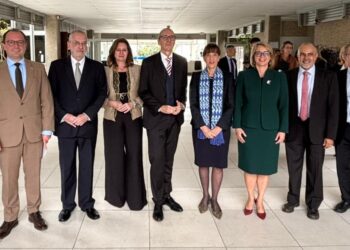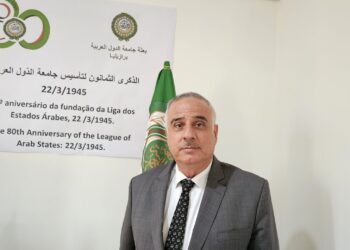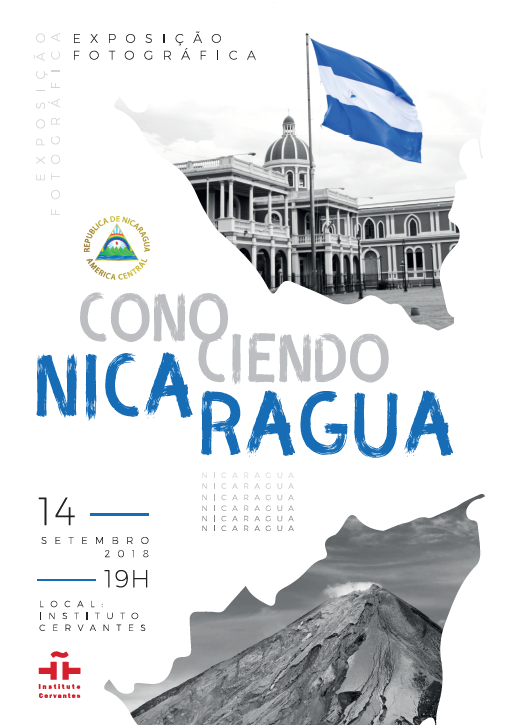
Liz Lôbo




Observed by Minister Nkosinathi Mthethwa and Professor Pio Penna Filho, Ambassador Joseph Mashimbye highlighted personal experiences experienced in apartheid. Photo: Beto Monteiro / Secom UnB
The program was also hosted by the UnB International Relations Institute, where the Nelson Mandela Memorial Lecture and the speech by the Minister of Arts and Culture of South Africa, NKosinathi Mthethwa, were held on September 14th. He presented a history of Mandela’s struggle against apartheid – a segregationist regime that existed in South Africa between 1948 and 1994 for university students. At this time, citizens were divided into groups according to their skin color and this determined the use of public and residential areas, transit through the country and access to basic education and health services.One of the regime’s laws banned mixed marriages in 1949. The following year, the Law of Immorality made sex crimes between people of different races a crime.



Thee Legacy makes music an instrument to spread messages of love and unity. Photo: Luis Gustavo Prado / Secom UnB

“This is a great time for the cultural relationship of our countries. Through this agreement in the audiovisual sector, we will work to boost cooperation, to find ways to stimulate co-production between Brazil and South Africa, “said Minister Sá Leitão. Mthethwa said he was feeling at home due to Brazilian hospitality. “With the agreement signed, we have to find ways to actually implement actions to put it into practice. We will be reminded not of the agreements we have signed, but of the actions we take, “said the South African minister.
BRICS – During the meeting, Minister Nkosinathi Mthethwa also stressed the importance of Brazil-South Africa cooperation under the BRICS (economic bloc composed of Brazil, Russia, India, China and South Africa). He thanked the Brazilian contribution to the 10th BRICS Summit and to the 3rd BRICS International Film Festival held in July this year in Johannesburg and Durban. “This agreement is a milestone that can boost cooperation in the area of the bloc’s creative industry,” said the South African minister.
Minister Sérgio Sá Leitão stressed that Brazil also has bilateral cooperation agreements in the audiovisual sector with India and China and that there are dialogues in this direction with Russia. “There are many similarities between our markets in the audiovisual sector. We have to stop being primarily consumers and we need to become producers. We have to tell our stories and no one better than us to do it, “said Sá Leitão.
Sá Leitão also informed that the MinC is organizing for the 4th BRICS International Film Festival, to be held in Niterói (RJ) in the second half of 2019. “We already have R $ 2.5 million reserved for the event. If it does not get as good as the 3rd Festival, which you have organized, we will come very close, “said the minister.
Mandela: Centenário de líder sul africano é comemorado em Brasília
Exposições, filmes, apresentações musicais, palestras e a visita do ministro das Artes e da Cultura marcaram a Semana Cultural da África do Sul
Para o povo sul-africano, o mês de setembro marca um tempo de celebração dos aspectos culturais de seu país. As comemorações envolvem performances musicais, linguísticas, históricas, gastronômicas, e acontecem em todo o mundo. Na semana passada foi a vez de Brasília, tendo como tema fundamental os cem anos de Nelson Mandela. O embaixador Joseph Mashimbye participou, de 11 a 15 de setembro, das diversas atividades promovidas pela sede diplomática para lembrar os 100 anos de nascimento do líder sul africano, em diversos locais da capital. A semana festiva deu-se início com a abertura da mostra “Mandela: de Prisioneiro a Presidente”, na sede do Itamaraty, com as presenças do ministro das Relações Exteriores Aloísio Nunes e do ministro das Artes e da Cultura da África do Sul, Nkosinathi Mthethwa.
O Ministro de Relações Exteriores Aloísio afirmou no discurso que não mediu esforços para trazer esta exposição para Brasília, pois esteve na África do Sul e gostou muito, e achou de suma importância que os brasileiros tivessem acesso às obras.
A exposição organizada pela embaixada da África do Sul, instituto Brasil África e o apoio do Itamaraty tem curadoria do Museu do Apartheid e fica aberta ao público até 4 de outubro, com entrada franca. A mostra já passou por França, Suécia, Estados Unidos, Equador, Argentina, Peru e Luxemburgo, alcançando um público de mais 1 milhão de pessoas. Agora, além do Brasil, serão realizadas montagens simultâneas no Canadá, Irlanda e Inglaterra. A capital federal é a segunda cidade brasileira a receber a mostra internacional, que já esteve em Fortaleza.
A programação também passou pelo Instituto de Relações Internacionais da UnB, onde foi realizada, no dia 14 de setembro, a palestra Memorial Nelson Mandela e o discurso do ministro de Artes e Cultura da África do Sul, NKosinathi Mthethwa. Ele apresentou um histórico da luta travada por Mandela contra o apartheid – regime segregacionista que vigorou na África do Sul entre 1948 e 1994 aos estudantes da universidade. Neste tempo, os cidadãos eram divididos em grupos de acordo com sua cor de pele e isso determinava o uso de áreas públicas e residenciais, trânsito pelo país e acesso a serviços básicos de educação e saúde. Uma das legislações do regime proibiu casamentos mistos, em 1949. No ano seguinte, a Lei da Imoralidade tornou crime relações sexuais entre pessoas de raças diferentes.
“Meu filho nasceu dois anos antes do fim do apartheid. Minha esposa é branca, então ele era um crime. Imaginem, o nascimento de uma criança ser um crime?”, contextualizou o embaixador Mashimbye, adicionando ao relato histórico sua experiência pessoal. “Mandela nos inspira à luta pela reversão de efeitos da injustiça social com coragem, compromisso com valores, respeito e amor”, acrescentou o ministro Mthethwa. O grupo sul-africano The Legacy – de música Isicathamiya, estilo de canto tribal que também é identificado como a capella, sem acompanhamento instrumental –, abrilhantou a festividade no auditório do Irel. Os artistas, juntamente com os músicos da banda Zamajobe também se apresentaram no auditório do Tribunal de Contas da União, TCU. Lá foram exibidos dois filmes sobre a vida de Mandela.
Parceria – No dia 13 de setembro, o ministro da Cultura, Sérgio Sá Leitão, e o ministro das Artes e da Cultura da África do Sul, Nkosinathi Mthethwa, assinaram tratado de cooperação bilateral para fomentar a produção audiovisual entre os dois países. As instituições responsáveis pela implementação do acordo serão as agências nacionais de Cinema do Brasil, a Ancine, e da África do Sul. O acordo contempla produções audiovisuais que tenham produtores ou coprodutores das duas nações. As obras produzidas nos termos do acordo terão direitos autorais compartilhados e farão jus a todos os benefícios previstos para o setor em ambos os países.
“Este é um grande momento para o relacionamento cultural de nossos países. Por meio deste acordo na área do audiovisual, vamos trabalhar para impulsionar a cooperação, para encontrar formas de estimular a coprodução entre o Brasil e a África do Sul”, afirmou o ministro Sá Leitão. Mthethwa declarou estar se sentindo em casa, devido à hospitalidade brasileira. “Com o acordo assinado, temos que encontrar formas de realmente implementar ações para colocá-lo em prática. Seremos lembrados não pelos acordos que assinamos, mas pelas ações que fizermos”, observou o ministro sul-africano.
BRICS – Durante o encontro, o ministro Nkosinathi Mthethwa também ressaltou a importância da cooperação Brasil – África do Sul no âmbito dos BRICS (bloco econômico composto por Brasil, Rússia, Índia, China e África do Sul). Ele agradeceu a contribuição brasileira para a 10ª Cúpula dos BRICS e para o 3º Festival Internacional de Cinema dos BRICS, realizados em julho deste ano em Johanesburgo e Durban. “Este acordo é um marco que pode impulsionar a cooperação na área da indústria criativa do bloco”, ressaltou o ministro sul-africano.
O ministro Sérgio Sá Leitão reforçou que o Brasil também tem acordos bilaterais de cooperação no setor audiovisual com Índia e China e que há diálogos nessa direção com a Rússia. “Há muitas similaridades entre nossos mercados no setor audiovisual. Nós temos que parar de ser prioritariamente consumidores e precisamos nos tornar produtores. É preciso contar nossas histórias e ninguém melhor do que nós para fazer isso”, disse Sá Leitão.
Sá Leitão também informou que o MinC está se articulando para a organização do 4º Festival Internacional de Cinema dos BRICS, que será realizado em Niterói (RJ) no segundo semestre de 2019. “Nós já temos R$ 2,5 milhões reservados para o evento. Se não ficar tão bom quanto o 3º Festival, que vocês organizaram, chegaremos bem próximo”, ressaltou o ministro.










